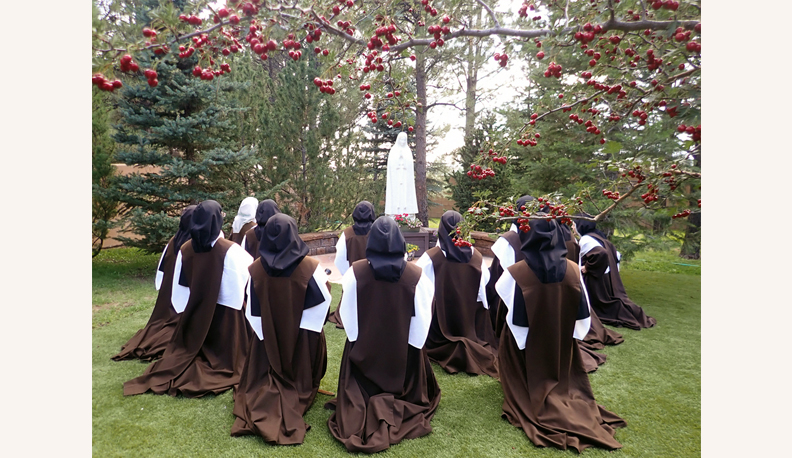
Holy Simplicity
God is sufficiently wise and good, powerful and merciful, to turn even the most apparently disastrous events to the advantage of those who, in simplicity, humbly adore and accept His will in all that He permits.
– Father de Caussade, S.J.
Dear Friends of Carmel,
As the seasons change, we are reminded that we have not been in touch with a newsletter since June! It was a busy summer – as all seasons are at Carmel!
Though our days are “busy” and full, they remain simple in the Carmelite daily life of prayer and work. But this does not make us unaware of the complexity of life outside our enclosure – in the world and in the lives of millions. These past few years have been a harsh trial for many, and there is little sign of things changing for the better any time soon. Societal changes can and have happened, seemingly overnight. And the road back to some semblance of order and true peace (God’s peace) can be long, dark and narrow.
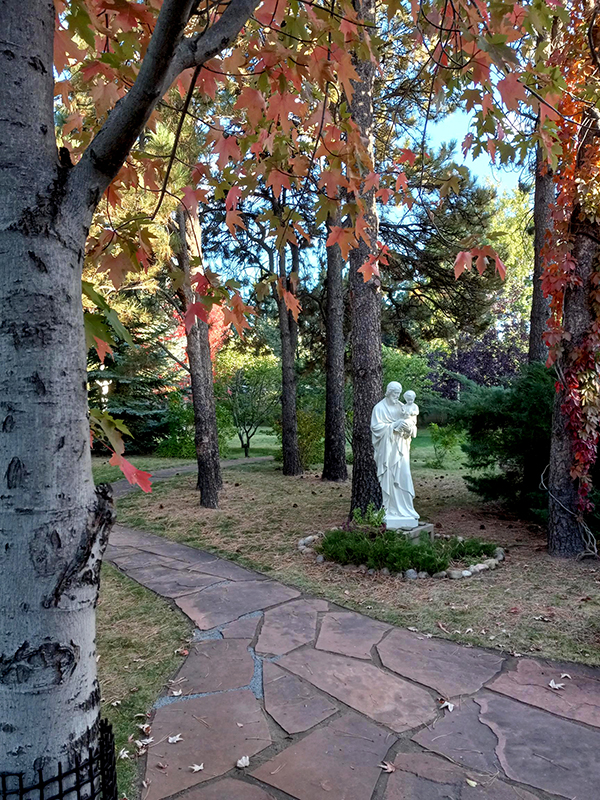
As we spoke of in our June Newsletter, the woes of the world and its turmoil make any thinking person desire the calm of stability. Whether they know and admit it or not, all souls seek the Source of calm and the Goal of all their strivings in life: God. Finding that stability in God, the searching, prayerful soul naturally feels that so much is in the way – not only in the world and its burdens and distractions – but in himself. Inherent in each one of us is the desire, even the dire need – to simplify.
Simplicity in life and in our spiritual life is what our loving God desires for us. God, Who is holiness and simplicity itself, and Who made us in His Own image, urges us by His grace in our souls, to become like Him. But let it be remembered that it is not we, but God Who accomplishes this in us – He is our sanctity. Our part in this great and necessary work of a lifetime is to cooperate with Divine grace, always disposing ourselves for His action.
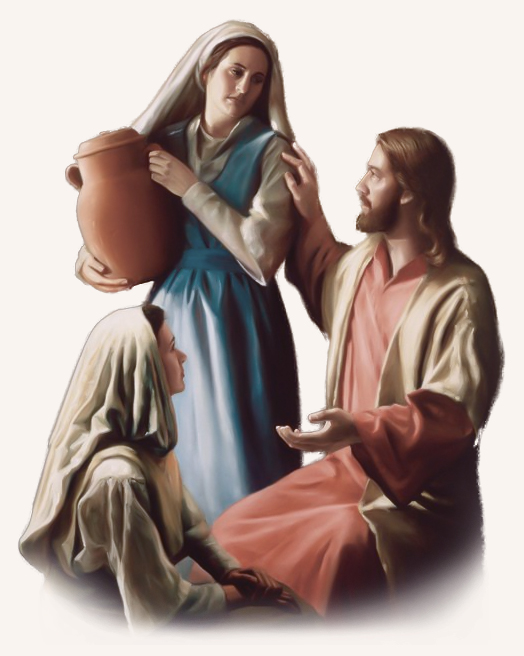
Certainly, Holy Scripture teaches throughout its pages the value of simplicity of life, heart and soul. Christ’s very life, His parables, promises and miracles – all preach of the simple, the unhindered, the free – and the long process of establishing this in our souls. Perhaps the most direct passage is from St. Luke’s Gospel (10:41-42), where Jesus Himself gives the lesson and the counsel. He is the guest of Martha and Mary, and Mary sits at the Lord’s feet, listening to His word, while Martha serves. When Martha complains, Jesus answers, “Martha, Martha, you are anxious and troubled about many things, and yet only one thing is needful. Mary has chosen the best part, and it shall not be taken away from her.”
We see, then, that Our Lord had “words of life” for Martha, too, and for us all. For what is the “one thing necessary”? It is to live in God, with God and for God. He Who created us, gives us through Baptism, sanctifying grace, a created share in His Own life. We must live united to God. We must stop in our tracks (well-worn) and recognize that this is what is really essential. Perhaps those first words, “anxious and troubled,” are the key to understanding the simplicity Our Lord is offering to us. Serve Me without wavering, with generosity and with zeal, but without fuss and bustle, without worry and disquiet of soul. All these things cause yet more trouble, because they tend to turn attention to oneself – and not to God at all, in the end.
The Lord of all, Who knows all things and is ever with us, well knows that life is filled, sometimes to the brim, with dilemmas and difficulties. Christ Our Lord lived in this world the human existence, and He recognizes that life is complicated! Pain, annoyances, frustrations, agony of soul and body are truly the lot of this life, at least now and again – and for some, anguish is continual and unrelenting.
It is our nature always to be trying to solve the problems of life. That very problem-solving is our innate attempt at all times to simplify our existence. Some of the ways of doing it can include uncluttering our lives of needless things (“stuff,” as they say!), commitments and yes, even people. Honest and humble taking stock of our life, day by day, (remember the examination of conscience? and that true freedom is detachment from evil and sin?) leads to simplicity and peace. However, simple does not mean easy, and this work cannot be done all at once. But the gradual letting go, the will to surrender, for love of God, the things of this world, finds us on the path to simplicity. Of course, all of this must be done prudently, with prayer, discerning all according to our vocation and position in life. Admittedly, some burdens cannot be lifted by our effort, but must be borne as the crosses they are meant to be, sent from God and until God wills to relieve the soul of them. Humble, patient acceptance of these, with our gaze upon the God Who loves us, is simplicity at work.
The lesson of simplicity is really all about detachment and trustful abandonment to God and His Providence – all for love’s sake and for the life that we must share with God. It’s about love! Faith and hope, too, but mostly charity, which must become in our souls eternal and without measure. A balanced spiritual life in the state of sanctifying grace, that life that we do indeed share with God, will become more and more simple. We then “travel light”!
Let the holy ones of God teach us:
Unless you become as this little child … Take My yoke upon you… Nothing can separate us from the love of God

Our Lord: “Come to Me all you who labor and are burdened, and I will give you rest… (Mt. 11:28-30).” “Seek first the kingdom of God and His justice … do not be anxious… (Mt.6:33-34).” “… Make for yourselves… a treasure unfailing in heaven… for where your treasure is, there also will your heart be Lk.12:32).” “Unless you turn and become like little children, you will not enter into the kingdom of Heaven (Mt. 18:3).”
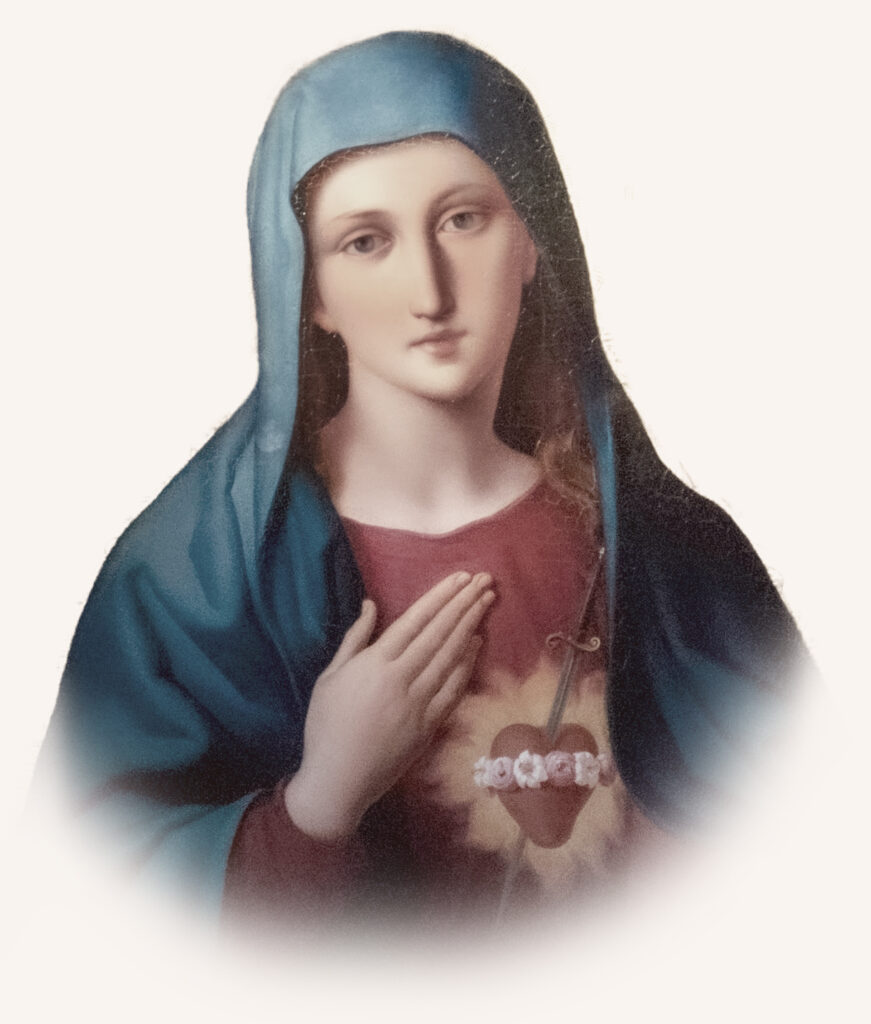
“Do whatever He tells you (Jn. 2:5)”. “My Immaculate Heart will be your refuge and the way that will lead you to God.” – to Lucia at Fatima
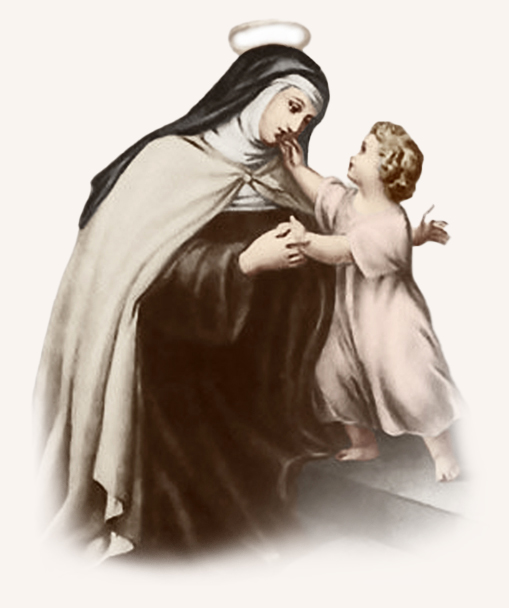
Our Holy Mother St. Teresa: “The closer one approaches to God, the simpler one becomes.” “It is love alone that gives worth to all things” “The important thing is not to think much but to love much; and so do that which best stirs you to love.” “Let nothing disturb you, nothing frighten you. All things pass. God does not change. Patience attains all things”

Our Holy Father St. John of the Cross, from Sayings of Light and Love: “Abide in peace, banish cares … and you will serve God according to His good pleasure, and rest in Him (70).” “Consider that God reigns only in the peaceful and disinterested soul (71).” “In the evening of life, we will be judged by love… (60).”

St. Francis de Sales: “Simplicity is nothing but an act of charity pure and simple, which has but one sole end, that of gaining the love of God. Our soul is then truly simple, when we have no aim at all but this, in all we do.” “Go in all simplicity; do not be anxious to win a quiet mind, and it will be all the quieter. Do not examine so closely into the progress of your soul.”
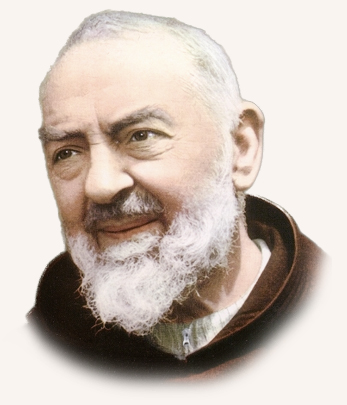
Padre Pio: “Love and practice simplicity and humility and don’t worry about the opinion of the world, because if the world had nothing to say against us, we would not be real servants of God.”

Saint Therese of Lisieux: “Our Lord needs from us neither great deeds nor profound thoughts. Neither intelligence nor talents. He cherishes simplicity.” “Everything is a grace because everything is God’s gift. Whatever be the character of life or its unexpected events – to the heart that loves, all is well.” “Holiness consists simply in doing God’s will, and being just what God wants us to be.” “Jesus does not demand great actions from us, but simply surrender and gratitude.” “I can nourish myself on nothing but truth.”
St. Augustine – “This very moment I may, if I desire, become the friend of God.”
Website News
Spiritual Reading For Simplicity
We are pleased to be able to offer yet another rare and out of print book from the Cross and Crown Series of Spirituality. It is one of the last to be published in the series, and perhaps that is why we have found so few. In any case, it is another treasure: Stages in Simplicity. The Dominican author, Fr. Francis Florand, presents the virtue in its many aspects – taking into consideration the psychological make-up of man and our tendencies, both good and bad. Beautiful chapters on the simplicity of Our Lady, the Saints, the Church open our eyes to the light of the Gospel, where we see the great Exemplar of simplicity, Our Lord, Himself. Needless to say in a book about simplicity, a saint often mentioned is St. Therese, and here is one pertinent remark of Fr. Florand:
Perhaps we have not noticed enough that as a prelude to her extraordinary discovery of the “little way”… there was an effort at absolute honesty, a will for impartial realism in the examination of her own resources. “When I compared myself to the saints,” she said, “I discovered that there exists between them and me the same disproportion that we see in nature between a mountain and a grain of sand.” In this manner she takes stock of her limitations. She is only a powerless and weak child. “To become great,” she adds, “is impossible. I must bear with myself such as I am, with my numerous imperfections.” She concludes that if she must become a saint – and she must, indeed, since it is the vocation common to every Christian soul, even if only a “little soul” – she will succeed only by following a spirituality of littleness to which she will surrender with the maximum in strength…
We promise to continue searching for more copies of this little book, as we do with all of the others we have presented over these past few years.
Other books to help in the quest for simplicity of life and soul:
The Art of Loving God – St. Francis de Sales, probably THE saint of simplicity and abandonment to the loving Providence of God. This little book comprises excerpts from his Spiritual Conferences to the early Visitandine nuns. Some of the short chapters: “Have confidence in God’s mercy,” “Be patient as you seek perfection,” “Simply love God,” “Turn your attention to God,” “Love God simply.” All of the books of this great and saintly director of souls are excellent.
When God is Silent: Finding spiritual peace amid the storms of life – One of our favorite books to recommend. It is comprised of excerpts from three special chapters in the classic book of Luis Martinez, Only Jesus (another Cross and Crown title!). The holy Archbishop speaks of what he knows from the communist persecution of the Church in Mexico in the mid-20th century: surrender to God’s Providence, listening to God in prayer, trusting in the love of Christ.
Patience & Humility – The great classic by Father Ullathorne. Patience so greatly aids in both simplifying and strengthening our heart, our soul and our life – and our life with others.
Holy Simplicity – A wonderful, little treasure by Father Raoul Plus, addressing all the ways to simplicity of life and holiness.
The Little Book of the Blessed Virgin Mary – Our Lady, after Christ Himself, is the exemplar of simplicity, humility and loving trust in God. Father Raoul Plus wrote his books with the aim of helping Catholics understand God’s loving relationship with the soul and the vital role of prayer in the spiritual life. It is wonderful to see his books coming back into print over these past years. This book was originally published by the author as Mary in our Soul-life. Fr. Plus speaks of Mary’s serenity and union with God even in her sufferings and how she is also united with us and prays for us. The subtitle of the book is “Model of Christians, Cause of our Joy.”
Humility and the Elevation of the Mind to God – A unique collection of meditative prayers by Thomas a Kempis, taken from the original Latin edition of all his works. The Imitation of Christ is thought to be by many the most influential book after the Holy Bible, and this book reflects the honor given to The Imitation. It includes a short life of this holy Augustinian priest, revealing the gentle, insightful soul behind the wisdom that has so helped the Christian soul.
The Holy Rosary
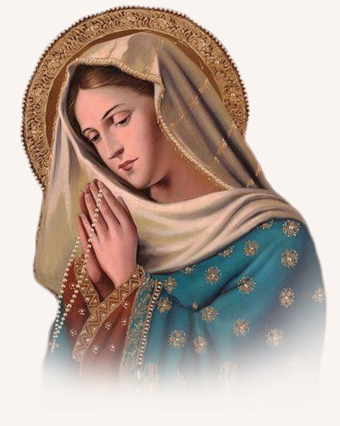
Fr. Plus touches on the Holy Rosary, and we may here mention this special devotion, since October is dedicated to this unique devotion. The Rosary is, in a way, an emblem of the way of simplicity. Simple in its structure of specific prayers and meditation, it is a simple prayer. But it is not easy to pray it well! For it requires our attention, our good will, our earnest and loving effort, our willing dependence on the help of God and His holy Mother. All of this is true of our worthy endeavor – and even struggle – to make our life simple and holy in God. We have spoken at this at length in past newsletters, our doctrine and devotions page and a sermon excerpt posted on our website.
We would also take this opportunity to remind you that if you are planning on a rosary for a Christmas gift, please order soon!
Infant of Prague
Our devotion/sacramental for this newsletter fits in well with our theme of simplicity, and that is the Infant of Prague. The history of this image is long and interesting – and closely tied to the Carmelite Order. We hope and plan one day to add a more detailed presentation about the Infant of Prague devotion to our Doctrine & Devotions website pages. But let the last part of the story, so significant for our own times, suffice for now. The original statue of the Infant of Prague had been presented as a gift to the Carmelite friars of that city. The Carmelites were later forced to flee from the city, and in the confusion of the war, they were unable to take with them their miraculous statue. The invaders seized it and threw it into a pile of rubbish.
In 1635, peace came to Prague, and the Carmelites returned. One of them, Father Cyril, who had previously, during his novitiate, received great spiritual help through his devotion to the Infant of Prague, sought the statue and found it amidst the rubbish, not noticing that the hands had been damaged in the violence.
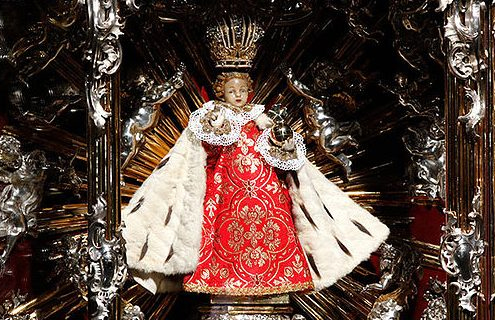
Overjoyed, he again placed the statue in the oratory. Father Cyril knelt in prayer before the small statue. Gazing upon the simple statue of the Child Jesus, he contemplated the most marvelous event in the history of the world, the Incarnation. He was filled with awe and wonder as he prayed to the God who became a Child because of His love for us.
Suddenly, the statue spoke to him. Father Cyril was stunned as he heard, these words of promise:
Have mercy on Me and I will have mercy on you.
Give Me hands and I will give you peace.
The more you honor Me, the more I will bless you.
The devout priest worked generously for the restoration of the statue, and the promises of the Great Little King were fulfilled abundantly, not only for the Carmelite house, but for the city and many devout souls – for centuries.
Symbolism of the Infant of Prague Statue
In the early days of the Church, the elaborate stained glass windows, wood carvings, and statues that filled Catholic churches were more than just devotional pieces of art. Many people couldn’t read, but the stories of the Bible and the doctrines of Faith were thus portrayed in the Church to help instruct the people. So many religious statues and images of the Saints are full of symbols, which tell us far more about our Faith than first glace might suggest. The Infant of Prague is most especially one of these. It is a very didactic image that speaks to all of the essential truths about the Incarnation of the Son of God.
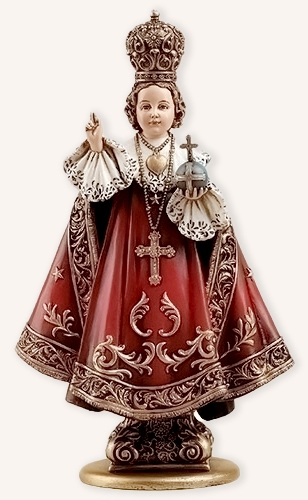
First of all, we see Our Lord as a Child, an Infant. While He is certainly not an infant anymore, but a grown man glorified in Heaven, this image points vividly to some of Our Lord’s favorite virtues: humility and simplicity. “Be as little children.” If Jesus, God Himself, assumed the state of infancy, helpless and dependent, in His nativity, how much more should we love and follow it!
His right hand is raised in blessing, with two fingers raised, bound with one gold ring. The two fingers represent the two natures, both Divine and Human, existing in the Second Person of the Holy Trinity. In His left hand he holds an orb, representing the entire world, which He created and redeemed. The cross surmounting the globe, symbolizes the Redemption. The Infant is often shown with a cross also around His neck. On His head is a crown, proclaiming His absolute right as King to rule both Heaven and earth.
The statue is often, though not always, dressed in rich robes that reflect the colors of the Church’s liturgical seasons, a custom which ties the image to the Liturgy and Mass in a special way, unlike any other image of the Church. And it is a fitting custom, for Our Lord is the principle Priest who presides at every Mass.
Other Infant of Prague Sacramentals
We offer on our website several different replicas of the original Infant of Prague, both wood-carved and resin statues. Less well known is the Chaplet of the Infant of Prague, composed by Venerable Sister Marguerite of the Blessed Sacrament.
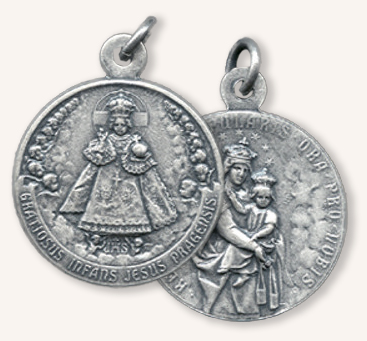
Our Lord revealed to her this devotion and told her how He was with it, promising special graces of purity and innocence of heart to all who practiced it devoutly. The unique prayer of this chaplet summarizes all that Jesus Christ is to us – in all of His redemptive work – “from the cradle to the grave” – and well beyond: Divine Infant Jesus, I adore Thy Cross, and I accept all the crosses Thou wilt be pleased to send me. Adorable Trinity, I offer Thee for the glory of the Holy Name of God, all the adorations of the Sacred Heart of the Holy Infant Jesus.
We also have a small booklet which gives a more complete history of the image as well as several devotional prayers, including the famous novena “in case of urgent need.”
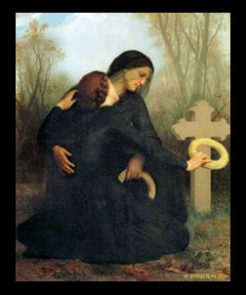
LAST REMINDER
If you have not yet enrolled the names of your deceased loved ones to be remembered at all of our Masses during the month of November, there are only a few more days to do so! Please click here to see the details and submit your names
Advent
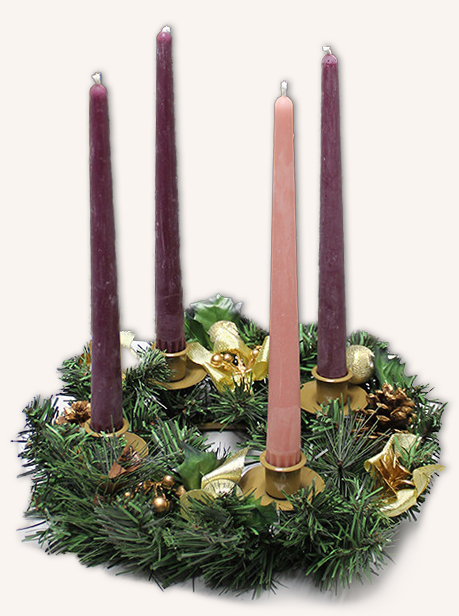
We know we have railed in the past against the commercial interests that start advertising Christmas earlier every year. While we usually send out some sort of “Advent newsletter,” this will probably be the last newsletter we are able to send before Christmas. So we take this opportunity to remind you not to wait until they are sold out to get your Advent candles (now available in 100% beeswax), Advent calendars, and Christmas cards. And by the way, we decided this year to offer boxes of Christmas cards, in addition to the packs of 10 cards. Both are proving to be popular!
Reading for Advent and Christmas
We have carefully selected titles for these seasons over many years. Bossuet’s Meditations for Advent provides doctrinal, devotional structure for daily prayer during these most prayerful seasons. Hardly any of the Saints can compete with St. Francis de Sales for his love of Christmas. His book of meditative conferences for Advent and Christmas are a joy: Advent and Christmas: The Sermons of St. Francis de Sales. To immerse oneself in the special Advent and Christmas liturgy is the best way to observe the seasons – it is to pray with the Church. Abbot Gueranger’s Liturgical Year offers no better way to accompany this prayer, with his explanations of scripture and prayers of the Masses, along with the edifying – and even fascinating history behind the seasons and customs of our ancestors in the Faith.
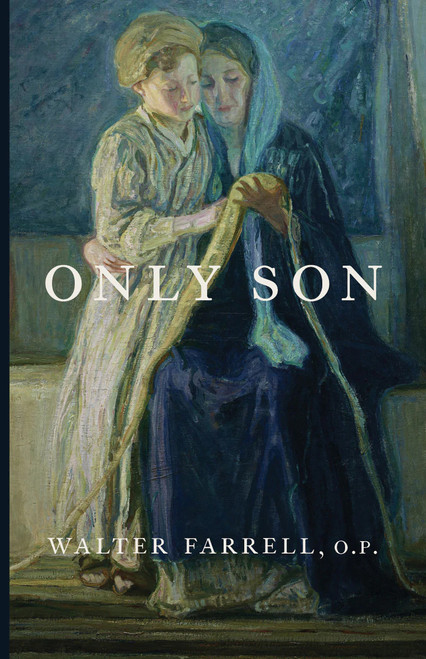
Earlier this year, we highly recommended the book Only Son, which at that time was one of our rare and out of print books. Happily, this year we can announce that this book is back in print in a good-quality paperback edition.
Gregorian Chant
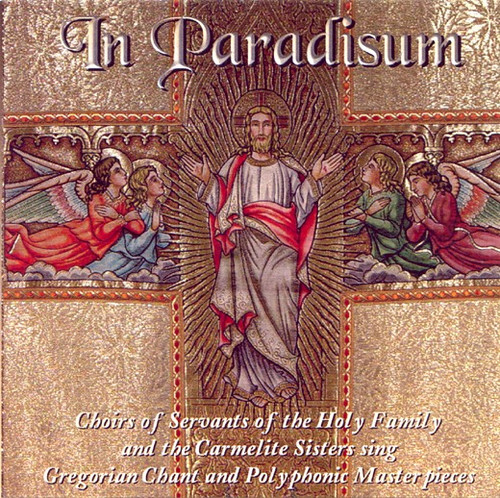
Earlier this year, during Lent, we introduced the streaming of our In Paradisum CD recording of polyphonic hymns and Gregorian chant. Since we are a Carmel very dedicated to the traditional holy liturgy of the Church, we have for a long time wanted to offer additional sacred music on our site. We are privileged to sing Gregorian chant throughout the year, and since it is the heritage of the entire Church, we are pleased now to share more of it with you.
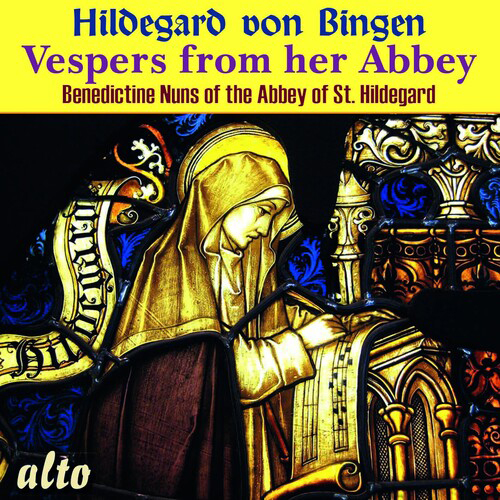
Many of you may be very familiar with the chants of the Church, while others may not know them at all. But all will relish the beauty and prayerfulness of these recordings. Our liturgical feasts offerings are varied here – from Advent and Christmas to Pentecost and the Feast of Corpus Christi. Some recordings are specifically Marian – Our Lady’s feasts and hymns. Several recordings have hymns specifically Eucharistic and for the celebration of Benediction of the Blessed Sacrament. One quite unique recording is of the Benedictine nuns of the Abbey of St. Hildegard in Germany singing Vespers, the evening prayer of the Church – reverent and lovely!
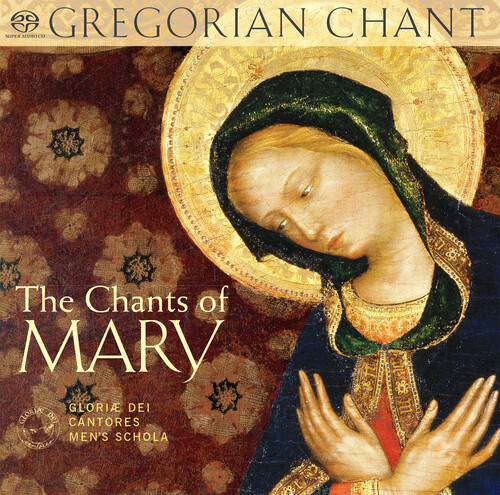
Polyphonic music from the Middle Ages and Renaissance is also the music of the Church. Composers such as Palestrina, Allegri, des Pres, Victoria, DuFay, Byrd, etc. composed Masses and hymns, as well as Psalms set to polyphony, all expressing glorious praise of God and joyous longing for Heaven – as well as the mourning of Our Lord’s Passion and Our Lady’s sorrows.
Hearing the prayer of the Church is another way of learning the true spirit of her prayer – and being united to it as faithful children of the Church.
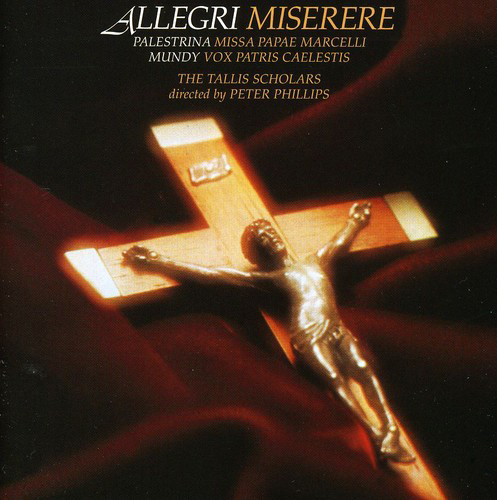
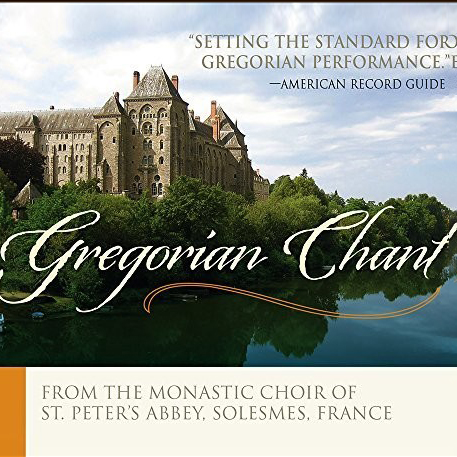
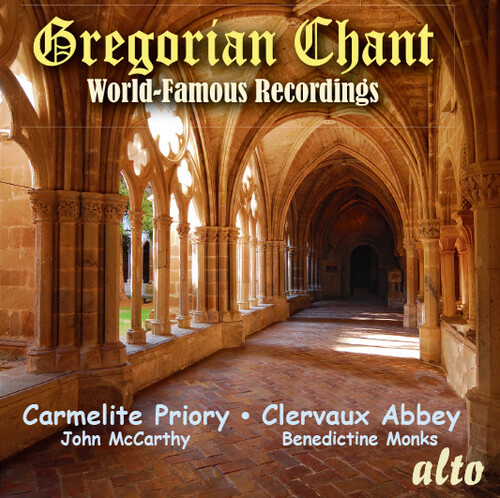
Chapel Veils

How many times have people written us or come to our turn asking about chapel veils, and we have had to send them away empty-handed. We now offer a selection of traditional style chapel veils on our site.
Sterling Silver Religious Plaques
Many years ago we offered these devotional sterling silver plaques, artistry imported from Italy. They are simply beautiful, and we are pleased to be able to bring them back to offer as wonderful gifts for homes, chapels and classrooms.
Community News
Carmel’s days always hold much work to do for the honor and glory of God, and the moments of the each day pass far too quickly. The word boredom has left our vocabulary, for every soul here is deeply involved in striving for the “one thing necessary,” and we know it to be found in our daily duty and the graces of the present moment all day long. Who could not be interested? But for us, too, obstacles, crosses and challenges present themselves to be offered to God. From God come answers and solutions.
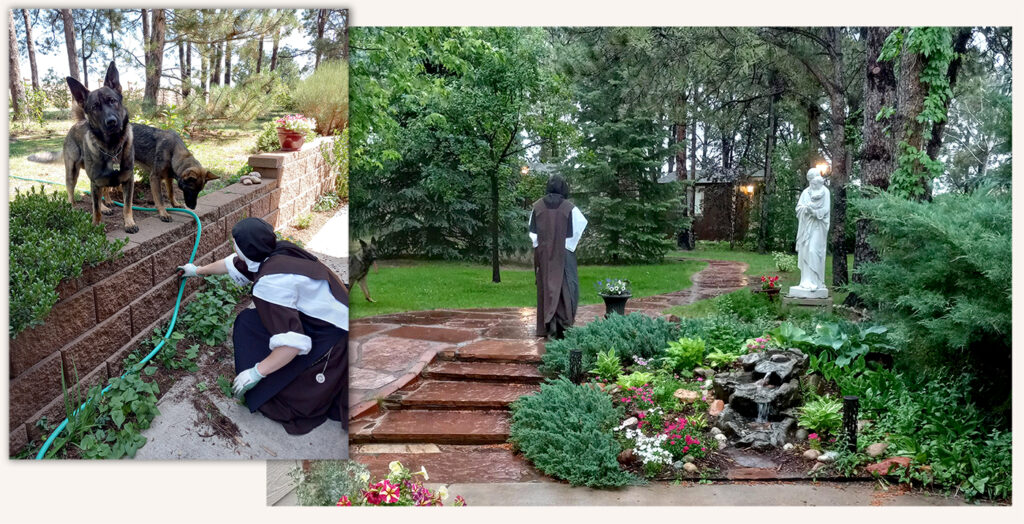
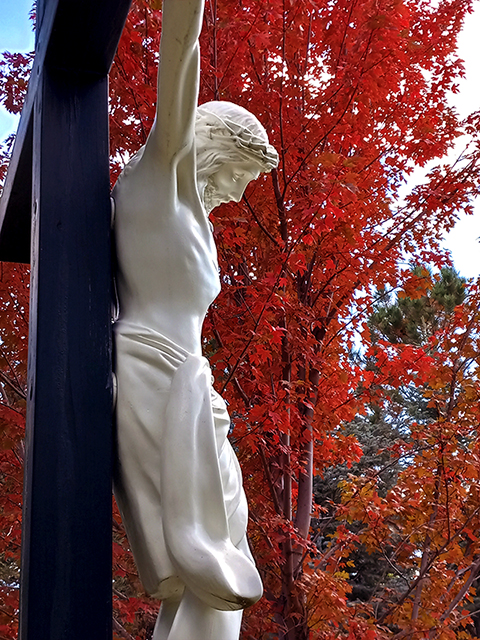
Our summer months are always full of gardening and small house repairs. This year we were blessed with a new tractor, which we are still in the process of learning how to use efficiently! Our Ohio Sister, who grew up on a farm, was the most at home. We started with a somewhat easy task – mowing the somewhat wild grass in our large field. We also expanded our vegetable garden and tried our hand at sweet potatoes and potatoes.
They were slow to grow, and alas, the gophers got most of them! But we had a harvest that was delicious. We are hoping next spring, after another big sewing/embroidery project is completed, to devote more time and energy to growing our own food. Several good friends who are experts are waiting in the wings with generous help and advice. These small, industrious families shared their own fresh produce this summer, so that it almost seemed we grew it ourselves. God reward them all!
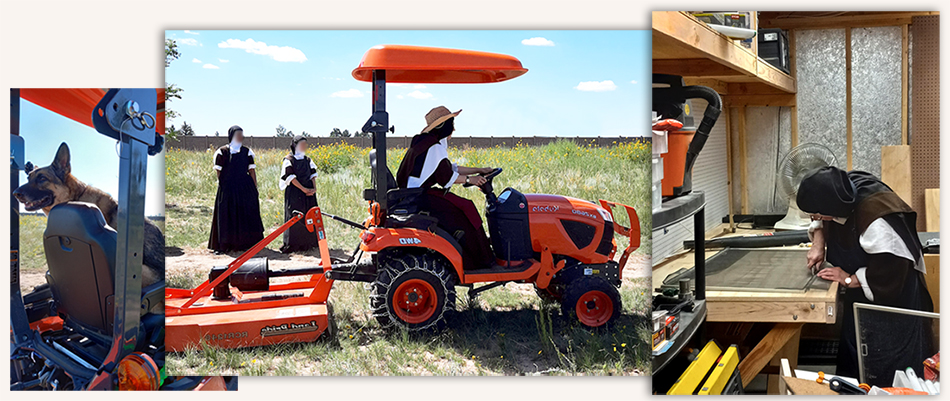
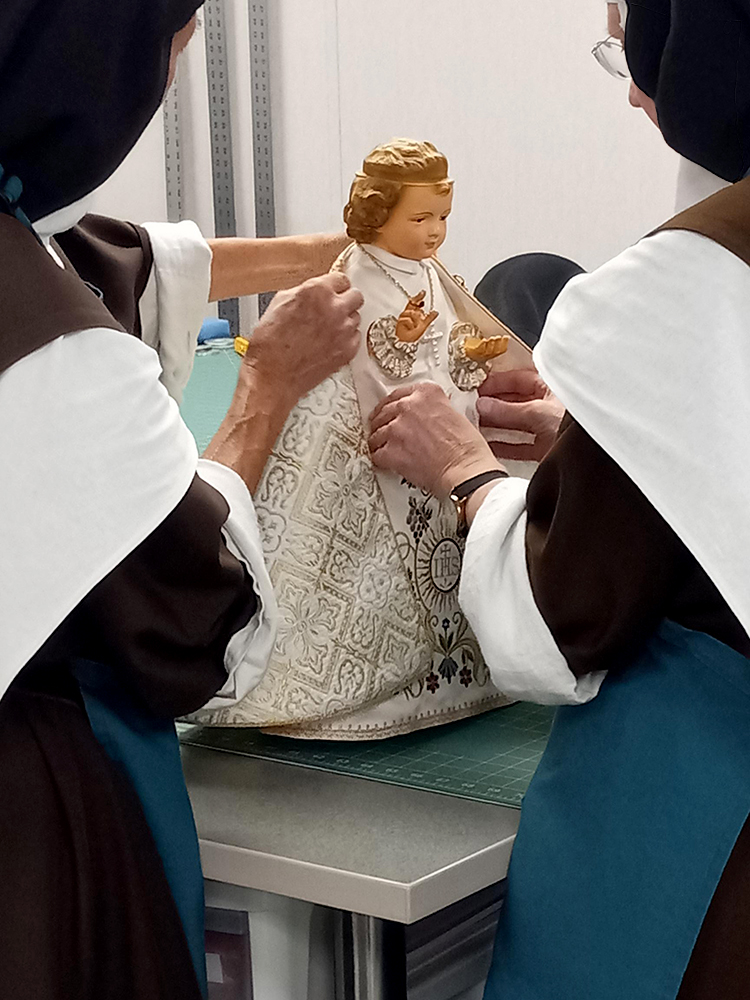
But the Little Infant that occupied much of our summer is the very beautiful statue in our public chapel that we share with the Community of Priests and Brothers. When the Priest Superior received a special grace that inspired him to repair and renew the statue, he asked us for our help. Well, what an honor! Needless to say, the sewing room kicked into high gear.
A new tunic gown was in order, complete with embroidery and capes with the colors of every liturgical season. The embroidery, ornate but simple, includes all of these colors and shades. We found mini “cope-clasps,” and replaced the plastic stones on the crown with Swarovski crystals. A couple of nicks were repaired, and the somewhat faded paint and gild work was touched up or redone, especially near the hands of the Infant.
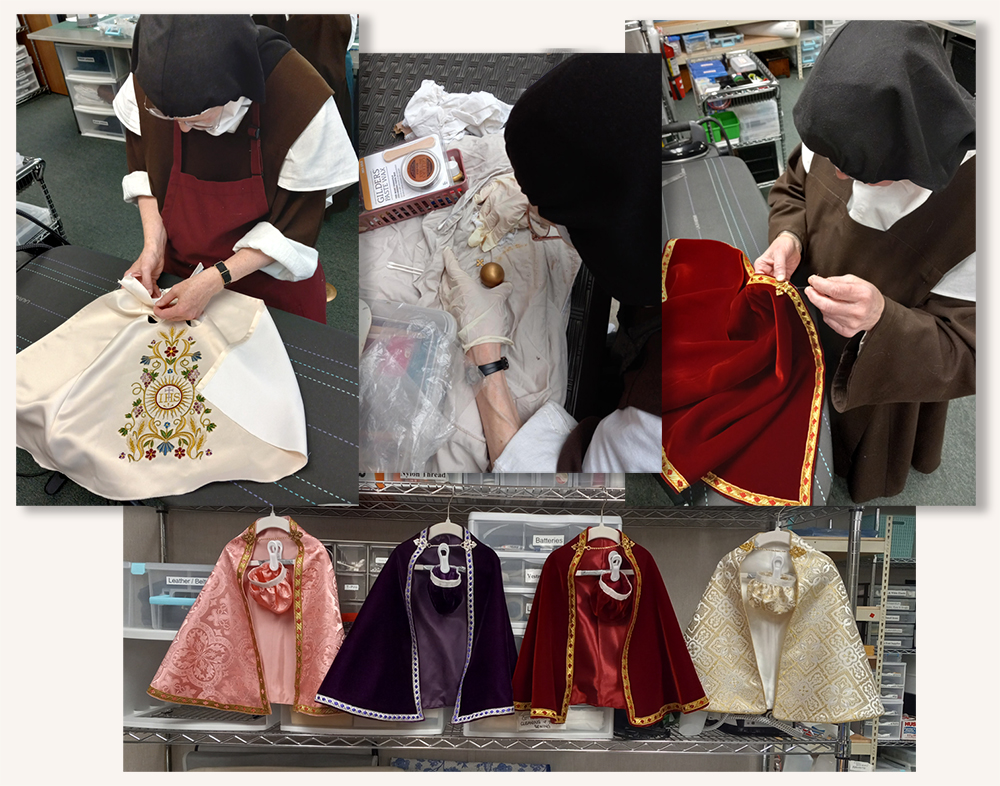
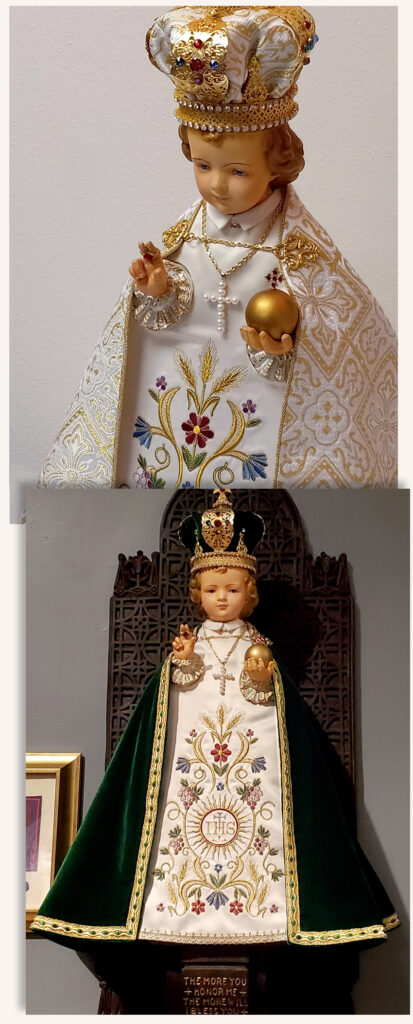
Making very small garments is more challenging that most people would think! But the extra challenge: we decided to make three of the capes with velvet fabric. Velvet is elegant and very royal-looking! But “velvet” is a word that inspires terror in anyone with sewing experience. The “nap” of velvet, which gives it such a rich color, is the source of greatest consternation for those attempting actually to make something out of it. Anything you try to attach to it, such as decorative trim or lace or clasp, shifts – whether you glue, baste or pin it on before sewing. It matters not how much glue, how many stitches or how many pins, the stuff just shifts. Velvet also stretches easily and shrinks easily, and if you happen accidentally to bump it with the iron or set something on it, a permanent mark remains to remind you just how clumsy you are. We often incorporate velvet into our vestment projects, but making an entire garment, however small, out of velvet left even our “velvet veterans” scratching their heads in wonderment.
The sewing room is littered with many little “practice capes,” as we pursued a “sure-fire” technique for getting the capes to fit correctly, have the trim actually be in a straight line – and not look war-torn in the end! Our thoughts often went back to the Infant’s words “The more you honor Me, the more I will bless you,” – and we couldn’t help but think He was using this project to give us more and more opportunities to honor Him. It has been a work of love for our Infant King, which engaged and even developed the special talents and labor of all of the Sisters.
As we were in the process of writing this letter, we celebrated the Feast of Our Holy Mother on October 15th. It is a special day in Carmel, and we all took something of a break from our pressing duties to celebrate our holy foundress’ Feast day, with solemnly chanted Vespers and a festive meal. A little over a month ago, on September 14th, when we renewed our vows in the bi-annual ceremony, Our Mother Prioress read to us these words of St. Teresa, which seem so fitting for these uncertain days:
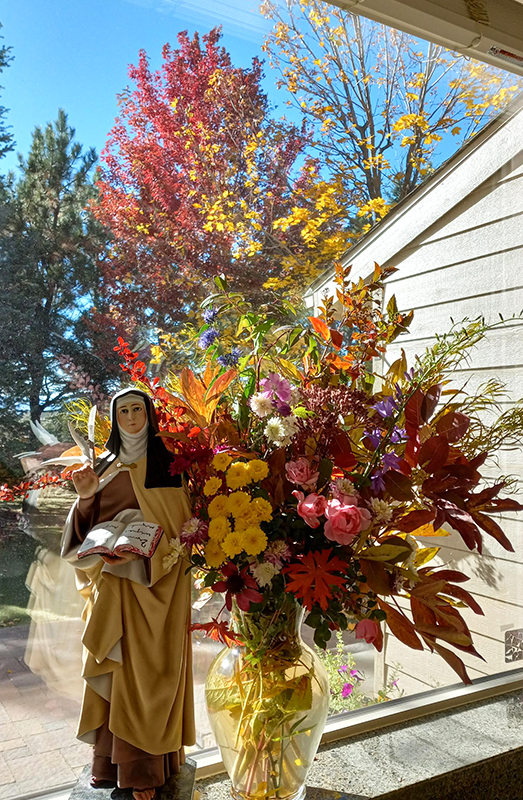
“They must have a great and very resolute determination to persevere until reaching the end, come what may, happen what may, whatever work is involved, whatever criticism arises, whether they arrive or whether they die on the road, or even if they don’t have courage for the trials that are met, or if the whole world collapses.”
It was such a timely reminder that nothing can stand in our way (the small obstacles such as unruly velvet, or the far larger ones in the world scene) of accomplishing our work for the glory of God and the salvation of souls. The next few months will be busy ones at Carmel, but know that you will be in our thoughts and prayers as we turn our thoughts toward Advent, Christmas, and the End of Time.
In Christ,
Your Carmelite Sisters
My Peace and My Joy
By St. Therese, January 21, 1897
Traslated from the original French by Donald Kinney, OCD
from the book The Poetry of Saint Therese of Lisieux
How many souls on earth there are,
Who vainly seek for peace and rest!
With me, ‘tis otherwise by far;
Joy dwells forever in my breast.
No fading blossom is this flower,
Of its decay no fear have I;
Like fragrant rose in springtime’s bower
So fair it is, yet shall not die.
Well nigh too great my gladness is,
All things I wish are mine to-day.
How can I help but show my bliss,
Who am so light at heart, so gay?
My joy I find in pain and loss,
I love the thorns that guard the rose;
With joy I kiss each heavy cross,
And smile with every tear that flows.
When clouds the sunny skies o’ercast,
And weary grows my heart the while,
My joy it is that joy is past,
And gone my Lord’s consoling smile.
My peace is hid in Jesus’ breast, —
May His sweet will alone be done!
What fear can mar my perfect rest,
Who love the shadow as the sun?
My peace,’tis like a child to be,
That doth not plan, nor understand;
So, when I fall, Christ raiseth me,
And leads me gently by the hand.
My childish love I manifest,
And for His grace alone implore;
Then, if He hide, my love to test,
I only love Him all the more.
My peace, it is to hide my tears,
Nor ever show my bitter pain.
What joy to suffer through the years;
To veil with flowers each galling chain!
To suffer, yet make no complaint,
Since this, my Jesus, pleases Thee!
Could any trial make me faint?
’Tis Thy sweet cross is laid on me.
My peace,— it is with God to plead,
In prayers and tears, by day and night;
For many souls to intercede,
And say to Him, my heart’s Delight:
“O Little Brother, Heavenly King!
For Thee the cross I gladly bear.
My only joy is suffering,
Since thus Thy earthly lot I share.”
I long would live an exile here,
If that be Thy dear will for me;
Or soon would flee from exile drear,
If thou shouldst call me unto Thee.
Since Love’s divine, celestial breath
is all I need, my heart to bless,
What matters life, what matters death?
Love is my peace, my happiness!


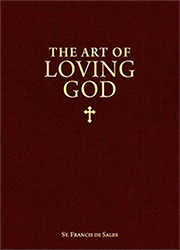

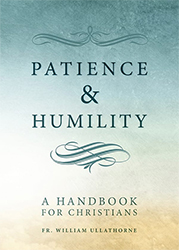
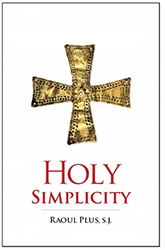
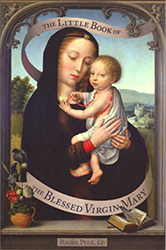
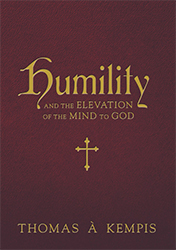
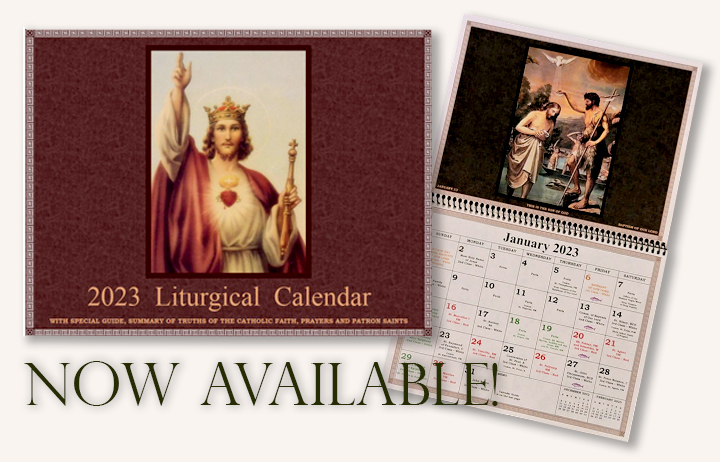
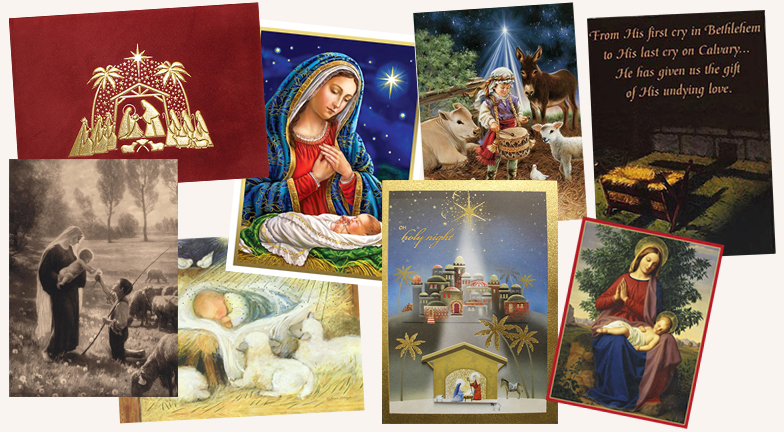
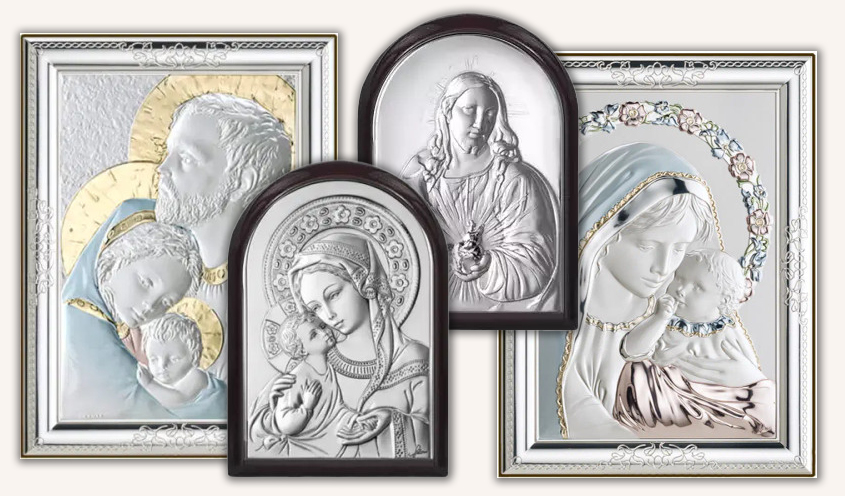
One thought on “Holy Simplicity”
Comments are closed.